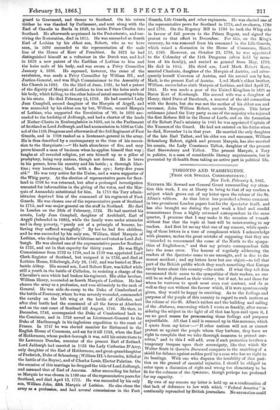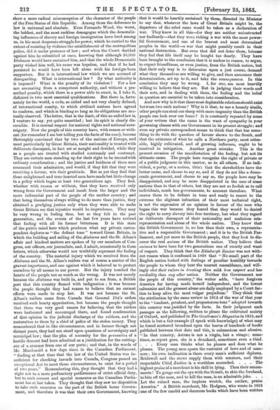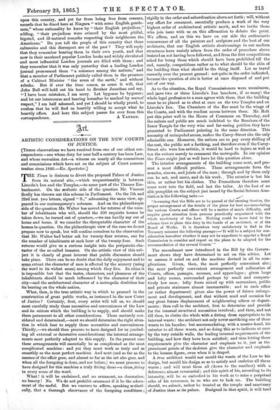TORONTO AND WASHINGTON.
[FROM OUR SPECIAL CORRESPONDEXT.
New York, February 4, 1865. NEITHER Mr. Seward nor General Grant commanding my atten- tion this week, I am at liberty to bring to that of my readers a subject which grows out of my letter upon the release of the St. Alban's robbers. As that letter has provoked adverse comment in two prominent London papers besides the Spectator itself, and has also brought me during the past 'week a kind and candid remonstrance from a highly esteemed correspondent in the same quarter, I presume that I may make it the occasion of remark without fear that the topic at least will be uninteresting to my readers. And first let me say that one of my censors, while speak- ing of these letters in a tone of compliment which I acknowledge with pleasure, makes the great mistake of supposing that they are "intended to recommend the cause of the North to the sympa- thies of Englishmen," and that my private correspondent falls into the same error. The honour of regularly addressing the readers of the Spectator came to me unsought, and is due to the merest accident ; and my letters have but one object—to tell that part of the British public which they reach something that Europe rarely hears about this country—the truth. If what they tell does recommend their cause to the sympathies of their readers, no one will be so well pleased as their writer ; but if not, he and those for whom he ventures to speak must even rest content, and do as well as they can without the favour which, if it were spontaneously given, they would be happy in receiving. As to the feelings and purposes of the people of this country in regard to such matters as the release of the St. Alban's raiders and the building and sailing of the Alabama, concerning which I wrote so frankly, after recon- sidering the subject in the light of all that has bra said upon it, I see no good reason for pronouncing those feelings and purposes unjustifiable. All that I said is summed up in this sentence, which I quote from my letter :—" If other nations will not or cannot protect us against the people whom they harbour, they have no right to complain that we take thorough measures to protect our- selves," and to this I will add, even if such protection involves a temporary trespass upon their sovereignty, like that which Sir Walter Scott in Quentin Durward compares to the snatching of a shield for defence against sudden peril by a man who has no right to its bearings. With one who disputes the tenability of that posi- tion on the ground of essential injustice, I should be obliged to enter upon a discussion of right and wrong too elementary to be fit for the columns of the Spectator, though perhaps too profound for my capacity. 4
By two of my censors my letter is held up as a confirmation Of that lack of deference to law with which "Federal America" is continually reproached by British journalists. No accusation could
show a more radical misconception of the character of the people of the Free States of this Republic. Among them the deference to law is universal and absolute. Even Fernando Wood, the word, the boldest, and the most reckless demagogue which the demoraliz- ing influences of slavery and foreign immigration have bred among us, in his most desperate struggle for power, which he carried to the extent of resisting by violence the establishment of the metropolitan police, did it under pretence of law ; and when the Court decided against him he submitted at once, knowing that although 50,000 Irishmen would have sustained him, and that the whole Democratic party wished him well, his cause was hopeless, and. that if he had persisted he would have been left alone with his foreign-born supporters. But it is international law which we are accused of disregarding. What is international law ? By what authority is it imposed? What is the penalty of its violation ? For a law not emanating from a competent authority, and without a pre- scribed penalty, which there is a power able to exact, is, I take it, deficient in two most essential qualifications. But there is, fortu- nately for the world, a code, so called and not very clearly defined, of international comity, to which civilized nations have agreed to conform, and which is binding so long as its obligations are mu- tually observed. The letter, that is the limit, of this so-called law is, I venture to say, yet quite unsettled ; but its spirit is clearly dis- cernible. It is mutual respect for national rights and national sove- reignty. Now the people of this country have, with reason or with- out (for remember I am but telling you the facts of the case), become thoroughly convinced that by two of the nations of Europe, and most particularly by Great Britain, their nationality is treated with deliberate disrespect, in fact set at naught and derided, while they as a people are treated with studied contumely and contempt. They see certain men standing up for their right to be treated with ordinary consideration ; and the justice and boldness of these men command their admiration, and would, if they felt that they were receiving a favour, win their gratitude. But as yet they find that these enlightened and true-hearted men have made but little change in a policy which began at least two generations ago. They feel, whether with reason or without, that they have received only wrong from the Government and insult from the larger and the more influential part of the people of the mother country; and that being themselves always will; g to do more than justice, they obtained a grudging justice only when they were able to make Great Britain see that injustice would be imprudence. They may be very wrong in feeling thus, but SO they felt in the past generation, and the events of the last few years have revived that feeling with all its former bitterness. It is this state of the public mind here which produces what my private corres- pondent deplores as "the defiant tone" toward Great Britain, in 'which the building and sailing of the Alabama and the St. Alban's affair and kindred matters are spoken of by our members of Con- grew, our officers, our journalists, and, I admit, occasionally in these letters, which otherwise would not truthfully represent the feeling of the country. The material injury which we received from the Alabama and the St. Alban's raiders was of course a matter of the gravest importance, and one against which it behoved us to protect ourselves by all means in our power. But the injury touched the hearts of the people not so much as the wrong. It was not merely because the Alabama was built in, and put to sea from, a British port that this country flamed with indignation ; it was because the people thought they had reason to believe that no earnest efforts were made to stop her. It was not because the St. Alban's raiders came from Canada that General Dix's orders received such hearty approbation, but because the people thought that there was very good reason for believing that the raiders were harboured and encouraged there, and found confirmation of tliat opinion in the judicial discharge of the robbers, and the restoration to them by a chief of police of the stolen money. They remembered that in like circumstances, and in former though not distant years, they had not stood upon questions of sovereignty and municipal law; that the plea of necessity for the prevention of a hostile descent had been admitted as a justification for the cutting- out of a steamer from one of our ports ; and that, in the words of Mr. Macdonald a few days since in the Canadian Parliament, "finding at that time that the law of the United States was in- sufficient for checking inroads into Canada, Congress passed an exceptional Act to meet those circumstances, to exist for a period of two years." Remembering this, they thought that they had a right not to a mere perfunctory performance of strict official duty, but to such earnest and special measures as the Canadian Parlia- ment has at last taken. They thought that they saw no disposition to take such measures on the part of the British home Govern- ment, and therefore it was that their own Government, knowing that it would be heartily sustained by them, directed its Minister to say that, whatever the laws of Great Britain might be, the departure of the rebel rams would be taken as a declaration of war. They knew in all this—for they are neither uninstructed nor foolhardy—that they were risking a war with the most power- ful Government, and one of the bravest and most determined peoples in the world—a war that might possibly result in their national destruction. But even that did not deter them, bee.ause they feel that life itself may be bought too dearly. They have been brought to the conclusion that it is useless to reason, to argue, to expect friendliness, or even justice, from the British nation, but that their only way is to determine upon a just course, demand what they themselves are willing to give, and then announce their determination, act up to it, and take the consequences. In this conclusion they may be wrong. I, for one, am most heartily willing to believe that they are. But in judging their words and their acts, and in dealing with them, the feeling and the belief in question are essential to be taken into consideration.
And now why is it that these most deplorable relations should exist between two such nations? Why is it that, to use a homely simile, other people can steal our sheep with more impunity than the British people can look over our fence? It is constantly repeated by some of your writers that the muse is the want of sympathy in your governing classes with our Government in its present struggle; and even my private correspondent seems to think that that has some- thing to do with the question of favour shown to the South, and that the existence of what he calls a Northern party, most estim- able, highly cultivated, and of growing influence, ought to be received in mitigation. Another great mistake. This is the present occasion of the manifestation of the feeli g, but not its ultimate cause. The people here recognize the right of private or of a public judgment in this matter, as in all others. If an indi- vidual, a party, or a nation, think that the slaveholders have the better cause, and choose to say so, and if they do not like a demo- cratic government, and choose to say so, the people here may be disappointed, and may be more disappointed in the case of same nations than in that of others, but they are not so foolish as to call individuals, much less governments, to account therefore. What causes them to be defiant in tone and ready to resent to the extreme the slightest infraction of their most technical right, is not the expression of an opinion in favour of the men who began this war because they feared that they would be denied the right to carry slavery into free territory, but what they regard as deliberate disrespect of their nationality and malicious mis- representation and abuse of the whole nation. They know that the British Government is, no less than their own, a representa- tive and a responsible Government ; and it is to the British Par- liament, and yet more to the British people, that they look to dis- cover the real animus of the British nation. They believe that animus to have been for two generations one of enmity and want of respect. They think that the Edinburgh Review was not with- out reason when it confessed in 1808 that "No small part of the English nation looked with feelings of peculiar hostility towards the people to whom they bear the nearest resemblance, and will- ingly abet their rulers in treating them with less respect and less cordiality than any other nation. Neither the Government nor the people of this country," the writer adds, "have forgiven America for having made herself independent, and the lowest calumnies and the grossest abuse are daily employed by a Court fac- tion to keep alive the most vulgar prejudices:' They think that the attribution by the same review in 1812 of the war of that year to the "insolent, petulant, and preposterous tone" adopted towards this country was justified by the facts. In their judgment such passages as the following, written to please the cultivated society of Oxford, and published in The Gentleman's Magazine in 1815, and which is but a fair example (I speak with knowledge) of what may be found scattered broadcast upon the leaves of hundreds of books published between that date and this, is calumnious and abusive. "In that country, Astrxs, is not a virgin, but a virago ; some- times, as report goes, she is a drunkard, sometimes even a thief. . . . Every man thinks what he pleases and does what he pleases. The young men spurn the restraint of laws and of man- ners; his own inclination is there every man's sufficient diploma. Bridewell and the stews supply them with senators, and their respectable Chief, Justice is a worthless scoundrel. . • . The highest praise of a merchant is his skill in lying. Then their amuse- ments To gouge out the eye with the thumb, to skin the forehead, to bite off the nose, and to kill the man, is an admirable joke. . Let the ruined man, the impious wretch, the outlaw, praise America." A British merchant, Mr. Hodgson, who wrote in 1824 one of the few candid and decorous books which have been written
upon this country, and yet far from being free from censure, records that he dined here at Niagara "with some English gentle- men," whose nationality he knew by "their English prejudices," adding, "their prejudices were evinced by the most pitiful, bigoted, and ill-natured remarks respecting their neighbours the Americans." Do you tell the people of this country that these calumnies and this disrespect are of the past ? They will reply that they remember hearing them in their own youth, and that now in their manhood popular London books and widely circulated and most influential London journals are filled with them ; and they remember that it was only yesterday that a leading London journal pronounced them "a nuisance among the nations," and that a member of Parliament publicly called them in the presence of a Cabinet Minister "the scum of the earth," and without rebuke. But if ever the time comes, as come it will, that John Bull will hold out his hand to Brother Jonathan and say, "I have been mistaken, I am sorry. Let bygones be bygones; and let our intercourse and bearing hereafter be marked by mutual respect," I am half ashamed, and yet I should be wholly proud, to confess that he will find us heartily willing to accept what he heartily offers. And here this subject passes for ever from this




































 Previous page
Previous page